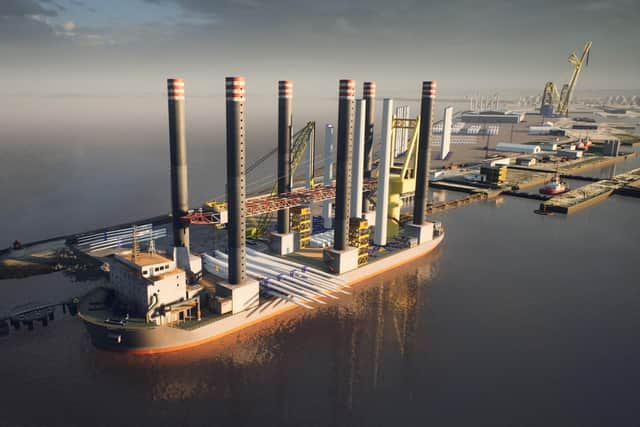Scotland’s biggest ports operator charts course to greener future with major investment
This article contains affiliate links. We may earn a small commission on items purchased through this article, but that does not affect our editorial judgement.
Forth Ports, which owns and operates commercial ports at Dundee on the Firth of Tay and Leith, Grangemouth, Rosyth, Methil, Burntisland and Kirkcaldy on the Firth of Forth, has outlined the actions it is taking to achieve a net zero carbon operation by 2042. It has also set an interim target of achieving carbon neutral emissions by 2032, while creating an infrastructure platform to “help accelerate the UK’s path to a decarbonised economy”.
The Leith-headquartered group, which also operates the vast Tilbury facility on the Thames, said that in order to achieve its targets it was overhauling and electrifying equipment and machinery, switching to low carbon fuels, increasing on-site renewable energy generation and promoting low carbon delivery alternatives such as rail and barge, among other measures. This is being complemented by “very significant investment” in new port infrastructure to support the offshore wind revolution taking place in the North Sea. The group is part of the Thames Freeport and Forth Green Freeport partnerships which are seeking to accelerate the drive to net zero across the country.
Advertisement
Hide AdAdvertisement
Hide AdWithin and around the firths of Forth and Tay, the group manages and operates an area of 280 square miles of navigable waters, including two specialised marine terminals for oil and gas export and provides other marine services, such as towage and conservancy.
Charles Hammond, group chief executive of Forth Ports, said: “I am pleased to lay out our plans for our operations to be carbon neutral by 2032 and to achieve net zero by 2042. We have already achieved a great deal in reducing our day-to-day emissions and enabling our customers to do the same. Our roadmap will aid the UK’s transition to a decarbonised economy. Large-scale market-ready port infrastructure is essential for the deployment of offshore wind. We have made significant progress in supporting the offshore wind sector through our initial £150 million investment programme - a key plank to enable the transition to net zero - with plans to invest significantly more as this market develops, including the infrastructure required for floating offshore wind as installations go into ever deeper seas.
“A greener future can only be achieved through collaboration,” he added. “We are a supporter and champion of the UK and Scottish governments’ clean maritime, net zero and green energy strategies and we continue to collaborate with our peers, customers and suppliers to deliver innovative and sustainable solutions as we transition to a net zero economy.”
All of the group’s ports now use environmentally sustainable sources of electricity, including on-site wind turbines at Tilbury, London’s major port. All new warehouses will have solar roof panels installed as standard, such as the recently built 100,000-square-foot facility at the Port of Grangemouth freight hub. A programme of rolling out new LED lighting is under way to further reduce power use across all port estates.
For mobile equipment and marine fleet, the group’s strategy is to blend and utilise alternative fuels. Initially this involves the widespread use of sustainably sourced hydrogenated vegetable oil (HVO) and, as technology develops, other methods of low emission propulsion. Forth Ports has also overhauled its rail offering by investing heavily at its terminals at Tilbury, Tilbury2 and Grangemouth, alongside progressing the reinstatement of a rail connection to Rosyth as part of the Forth Green Freeport initiative. The branch line linking Rosyth dockyard to the mainline at Inverkeithing still exists but several sections are overgrown through lack of usage for more than a decade.


The group highlighted major investment in port infrastructure to support the roll-out of ScotWind at Dundee and Leith, which will create “high quality green jobs” and help facilitate Scotland’s transition to a net zero future. In addition, it has recently installed shore-side power at Leith and its new development, Tilbury2, is shore-side power enabled to help drive down in-port emissions from visiting vessels. Bosses said they were working with the company’s supply chain to drive down “scope 3” emissions. These mainly stem from the use of steel and aggregate when constructing infrastructure or purchasing mobile port equipment and marine vessels. As a result, Forth Ports is “pro-actively engaging” with suppliers to find fit-for-purpose, low carbon emission alternatives. For example, the construction of Dundee’s renewables quay, branded DunEco Quay, used steel pipes fabricated from reused or recycled materials.
Màiri McAllan, cabinet secretary for net zero and just transition, said: “I welcome today’s commitment from Forth Ports, to achieving carbon neutrality by 2032 and net zero by 2042. I visited Forth Ports’ Grangemouth facility recently, and what was made clear to me was the critical role that ports play in our economy. It is encouraging, then, to see such a key operator show leadership and commitment to maintain and grow that role in Scotland, as we transition to net zero. This commitment builds on impressive achievements to date, and I look forward to seeing Forth Ports’ full net zero plan and how, working collectively, we can help deliver our ambitions for a just transition to net zero.”
UK transport secretary Mark Harper said: “Achieving net zero by 2050 is crucial for the transport sector and this announcement is the sort of bold ambition needed to get there. Forth Ports’ actions set a clear example of how the UK’s maritime industry can excel in a carbon-free world, encouraging investment, improving infrastructure and creating more jobs - making way for a cleaner, greener future.”
Comments
Want to join the conversation? Please or to comment on this article.